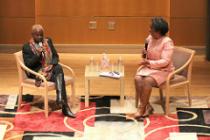A CONVERSATION WITH AFRICA’S PREMIER DIVA
By Gabriela Martínez
Angélique Kidjo, Grammy award-winning singer-songwriter and activist from Benin, visited the University of Maryland for the WORLDWISE: Arts and Humanities Dean’s Lecture Series to talk about her life story and the role of music in activism.
As soon as she walked onstage and sat down for her live discussion with Sheri Parks, associate dean of University of Maryland’s College of Arts and Humanities, Angélique Kidjo looked at the audience and said “You are all so quiet. We’re talking about art, man.”
Using her own lively stories about her childhood in a village in Benin, Kidjo captured the audience and lightened the mood. An inquisitive child—known affectionately in her village as “Where, what and how?”—Kidjo was privileged for having parents who greatly valued her intellectual development.
Kidjo’s mother, a skilled costume designer, created a theater in her community. As a child, Kidjo would spend time climbing in and out of the animal costumes her mother made. One night, when her mother did not have enough actors between scenes, she made Kidjo go onstage. Not knowing what to do, Kidjo decided to belt out a song.
It was after that moment that Kidjo decided that she wanted to spend her life onstage.
When asked what it feels like to be the queen of African music, Kidjo responded “I don’t believe in kings or queens.”
She said her nature is to defy structures of power, which she did after deciding to leave Benin, having realized that the country’s communist regime was not going to foster her creativity and desire to grow intellectually.
Escaping Benin was not easy, she said. At the time, citizens who wanted to leave the country needed to get authorization from the government. Kidjo, however, was lucky. Her brother’s friend, who was working as airport security at the time, let her board the plane while his supervisor was in the bathroom.
“I’ve never ran so fast in my life,” Kidjo said.
When Kidjo arrived in France, she experienced racism and cultural estrangement in French society, and at the educational institution she graduated from—the CIM Jazz School of Paris.
On her way to register at the school, Kidjo asked for directions from two students.
“Jazz is not for African people,” one of the students told her.
The head of the school, having overheard what the girls had said to Kidjo, told Kidjo that she could prove those students wrong. At the end of the school year, he introduced her to the person who produced her debut album “Parakou.”
Since then, Kidjo’s fame has skyrocketed. She won her first Grammy in 2008 for her album “Djin Djin” and was named one of the 40 most powerful celebrities in Africa by Forbes.
Kidjo also discussed her work with the Batonga Foundation for Girls in Africa, which aims to empower girls and young women in Africa through educational opportunities. Kidjo is currently working on a cellphone-based program that collects information about girls in different African villages and maps it out according to different locations.
The purpose of the program is to find out how girls are living, if they are in school, forcefully married, or going through other types of difficult living situations. Kidjo’s foundation will develop an educational approach for girls based on the needs of the community reflected through the data.
For Kidjo, the first step in creating humanitarian programs for Africa, is giving voices to people and finding out what are their genuine needs.
“I don’t believe anyone can make any change in Africa if the African people are not in the center of the change,” Kidjo said. “If you don’t ask them what they need, how can you bring a program that makes any sense to people?”
After the discussion, Moses Namara ‘16, a computer science major originally from Uganda, asked Kidjo for advice on how to improve the education system in different African countries.
In response to Namara’s question, Kidjo advocated for the role of youth in a country’s social and educational development, at the same time warning against starting revolutions and “breaking a system” without a plan.
“The platform is there—use it wisely,” said Kidjo, who is optimistic about the power of the Internet, but also wary about its potential to isolate people.
After graduating from the University of Maryland, Namara will return to Uganda to teach basic programming classes at different local universities, including the Kampala International University.
Toward the end of the program, students gathered around Kidjo to discuss issues of colonialism and social injustice in Africa.
“She is very engaging,” said Peace Gwam ‘17, an economics and history major. “I like that she really called us to action as young students.”
Soulyana Lakew ’17, an economics major originally from Ethiopia, is interested in the role of the western world in the development of Africa.
“It is so refreshing to meet people with integrity,” Lakew said. “A lot of the role models we are given in society are so corrupt. To find someone who is able to use their voice for good and who is true to their word is so inspiring.”





